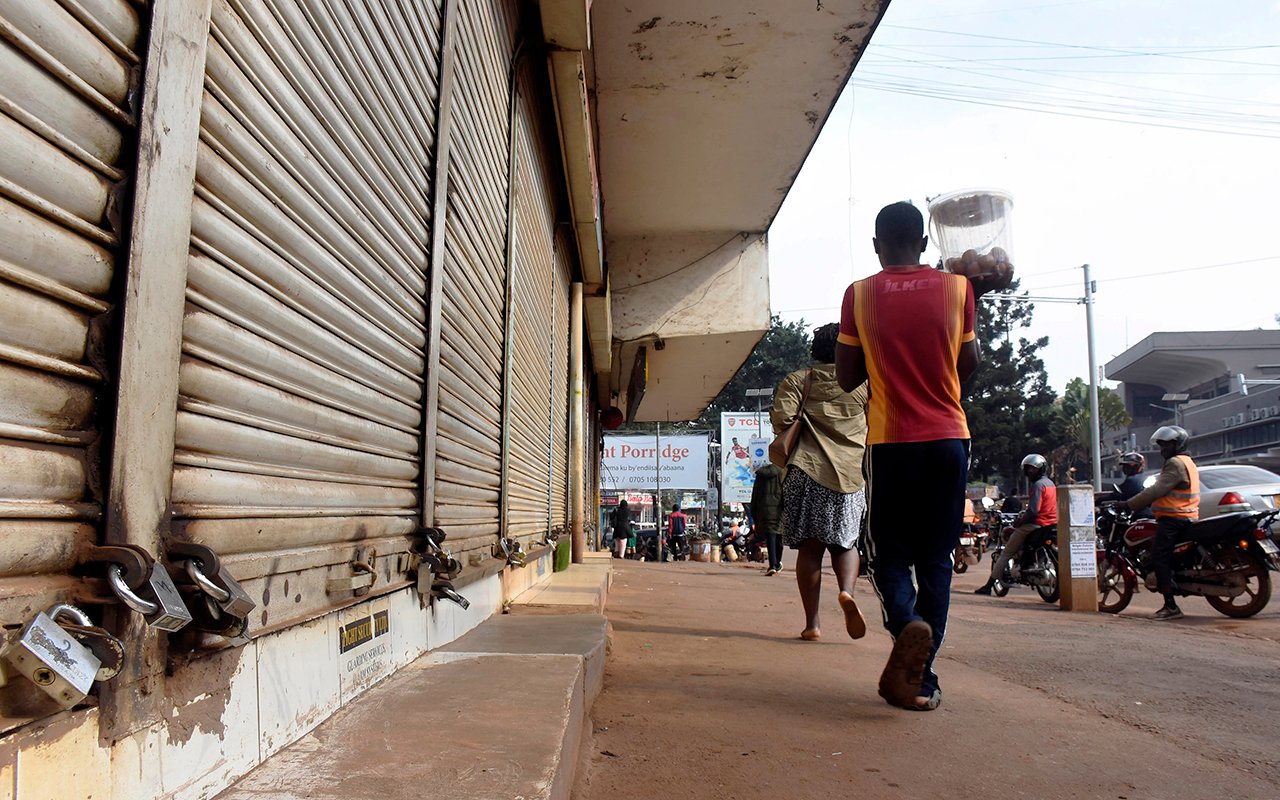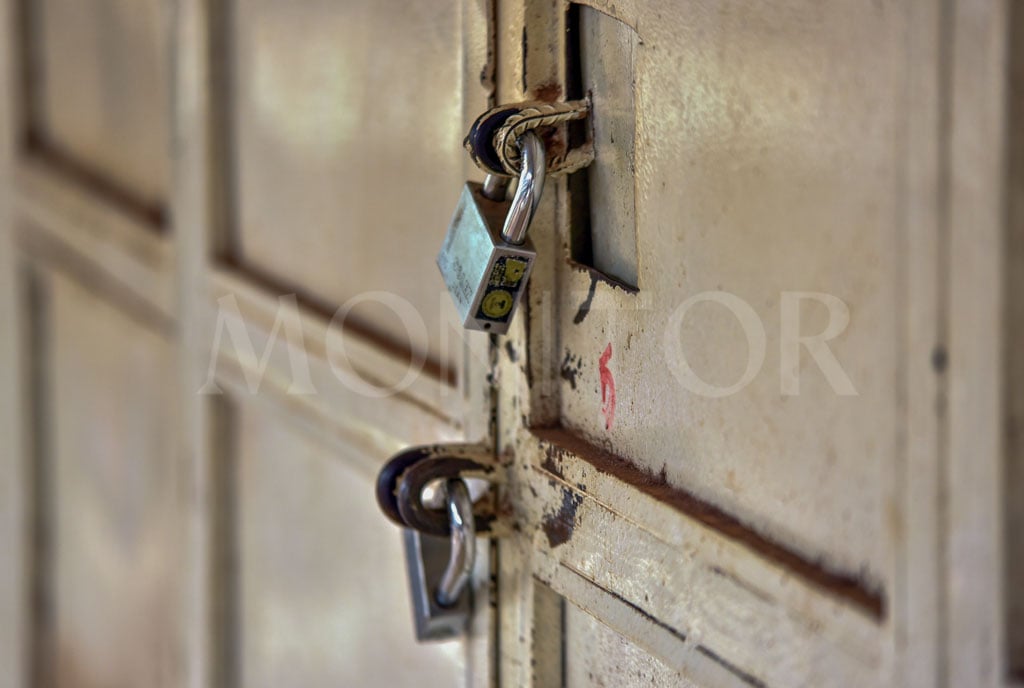
Several shops on Kampala Road were closed on Thursday after the traders protested against the Electronic Fiscal Receipting and Invoicing Solution (EFRIS) being implemented by the Uganda Revenue Authority. PHOTO/ISAAC KASAMANI
Imagine you own a business or handle personal finances and one day, you are hit with a tax assessment from the authorities that seems incorrect. You review it and realise the taxman has made an error in the calculations. You contest the issue, but fail to reach an agreement. You are then informed that you can appeal. But before being heard, you must pay 30 percent of the assessed tax as stipulated under Section 15 of the Tax Appeals Tribunal (TAT) Act. You do just that, and it is crisis averted. For now.
Not everyone, however, can relate to the aforesaid lived experience. Fred Muhumuza, a policy analyst and a former Finance ministry adviser, says the system is susceptible to failing people.
“Some people don’t have that cash and at times the tribunal can take long to hear cases, which deprives the aggrieved entity their money after payment,” he says, adding: “Even if you are a big company, 30 percent is a big portion. That’s why many people have avoided the tribunal and gone to higher courts, but still they have found themselves sent back, because that’s its ideal role.”
What’s the Tax Appeals Tribunal (TAT)?
Established by an Act of Parliament, the TAT serves as an independent specialised court providing taxpayers with accessible, efficient, and independent arbitration in disputes with the Uganda Revenue Authority (URA). When URA issues a default notice, taxpayers have 45 days to respond with documentation. The taxman must then make an objection decision within 90 days. If the taxpayer disagrees, they can apply to the TAT within 30 days of the decision.
The TAT first refers the case for mediation, allowing 60 days for resolution. If mediation fails, the TAT will then proceed to a full hearing. The TAT prioritises mediation due to its speed and less adversarial nature, with more than 70 percent of cases settled this way.
The tribunal’s team is skilled in accounting, law, and taxation. The only challenge it faces is the case backlogs, particularly during the recent four-month period to May where there were plenty of delayed substantive cases heard as the selection of the tribunal’s new chairperson was in process. This delay impacted both the tribunal’s operations and the funds of aggrieved parties. But the tribunal’s aim is to reduce backlogs in the Judiciary and commercial courts to ensure timely revenue collection for fiscal needs. This, however, poses a serious challenge for cash-dependent businesses like retail chains, construction firms, healthcare providers, real estate companies, logistics, and food and beverage industries, which need immediate cash for operations.
Even if your business isn’t cash-dependent, what happens if mediation with the tribunal fails and you face a hearing that demands a 30 percent tax payment upfront? What if you can’t afford it? The National Treasury asserts that the State should not be deprived of revenue simply because a taxpayer is contesting their assessment. In fact, the State is feverishly looking for ways to get enough cash revenue through avenues like this. How far can it, however, go without straining the taxpayer?

Resolution. The number of days the TAT allows for a resolution after first referring the case for mediation. If mediation fails, the TAT will then proceed to a full hearing.
What you need to know about cash flow qualms
Nile Breweries Ltd experienced this first-hand. In July, the brewer contested a Shs18b tax liability at the TAT. The company challenged the requirement to pay 30 percent of this amount upfront, citing the crucial role of cash flow in its operations. Nile Breweries argued that URA improperly charged local excise duty on its exported goods and assessed VAT at 18 percent instead of the zero rate mandated for exports. The brewer sought an injunction allowing it to make the payment in instalments due to its significant impact on cash flow and business continuity.
Similar requests have been made by major companies like MTN Uganda and Century Bottling Company Limited, which bottles Coca-Cola and Fanta in the country. The latter successfully argued for an instalment plan to pay its Shs58.1 billion tax assessment, citing cash flow issues from operating at reduced capacity during the pandemic. The company’s 2019 tax audit by the State revealed a Shs58.14 billion liability from 2014 to 2017, including local excise duty, VAT, and corporate income tax. Century Bottling Company Ltd contested this assessment and sought to pay the 30 percent upfront tax in instalments until its appeal was resolved, a stance Nile Breweries has now adopted.
“The recovery of the entire assessment,” it argued, “would cripple its business, but also lead to loss of reputation and market share, as its liquidity and operations will be permanently affected. This would not only affect its continued economic contribution to the national fiscal effort but also negatively affect its employees.”
The soda maker successfully obtained a temporary injunction, halting URA from collecting the assessed tax until the main TAT case was resolved.
Nile Breweries Ltd cited this aforementioned case in the tribunal to argue for instalment payments of the required tax before the tribunal hearing. The tax authority contended that Nile Breweries must prove that without the injunction, it would face irreparable harm not covered by damages, and that the case should favour convenience if in doubt. The beer maker then requested to provide a bank guarantee of Shs1.388b, which URA denied.
The tribunal, consisting of Mr Siraj Ali, Ms Christine Katwe, and Ms Rosemary Najjemba, reviewed Nile Breweries’ argument and concluded that the company should be allowed to pay the 30 percent tax in instalments due to the substantial amounts involved. They stated that Nile Breweries’ situation was not comparable to a litigant failing to comply with Section 15 of the Act and without this accommodation, the company would suffer irreparable injury, which they defined as substantial or material damage that cannot be adequately compensated by damages.
“The applicant will pay 30 percent of the tax in dispute in four equal instalments of Shs1.388 billion each beginning on July 15, 2024,” it ruled.

A taxpayer has 45 days within which to respond, with documentation, when URA issues them a default notice.
Why should you care?
Essentially, the two big companies successfully put their case to the tribunal by sketching a substantial domino effect that had the potential to cause their businesses, value chains, suppliers, employees and the sector they work in to fold. What, however, happens when one can’t establish this substantial literature to convince the tribunal in a tax dispute?
The State’s position is that if a taxpayer is found liable and fails to mediate with the Commissioner General or the tribunal, they owe the government money. This provision aims to prevent characters from exploiting the judicial system to delay or deprive the State of tax revenue. A source at the tribunal emphasised that this ensures government operations continue despite ongoing disputes, providing a form of security.
This requirement has, however, become contentious, with taxpayers increasingly pushing back against an assertive tax authority eager to meet ambitious collection targets. While this mandate ostensibly supports government tax collection efforts and aims to deter frivolous claims, it imposes a significant financial burden on those seeking redress.

Mr John Sebuuma, taxation and economic policy analyst. Photo/File
Is it contentious?
This requirement has been litigated up to Uganda’s apex court, questioning whether it contravenes the constitutional right of access to justice and if the 30 percent payment should be made in money or an equivalent form. The TAT has ruled that bank guarantees do not qualify as payment, requiring actual money as part of the payment mix, as demonstrated in its recent ruling involving Vivo Energy Uganda Limited.
Vivo faces a Shs59 billion demand from URA due to a share sale by a foreign shareholder in July 2022. The tax authority attributes the gains to VIVO Uganda, holding it liable for capital gains tax. Vivo sought a declaration from the tribunal that the 30 percent payment requirement did not apply to its case and, alternatively, requested a bank guarantee for the payment. The tribunal rejected this, stating that a bank guarantee is not considered payment, but merely a promise.
Many tax advocates worry that this hunger for the tax threatens fairness in tax administration and justice since the pre-emptive payment deters many from challenging erroneous assessments, “obstructing their quest for justice.” Tribunal officials reached by this reporter, referencing the Vivo Energy case, argue that the law requires an actual payment, not a bank guarantee, which is merely a promise of payment in case of default, according to Black’s Law Dictionary.
“We can’t go outside the law, unless there is a change in it. Parliament should provide it so that we are clear about this and we don’t operate on ‘perhaps’ in a tax law,” one stated.
The tribunal in its ruling indeed did note that “...while it is true that the primary purpose of a guarantee is to ensure a payment will be made at a certain point in time upon the occurrence of an event, that does not make a guarantee a form of payment. The requirement under Section 15 is for a payment, and not a guarantee.”
The constitutionality of the 30 percent payment requirement before taxpayer objections to tax assessments was first considered by the Constitutional Court and later by the Supreme Court in the 2010 case of Uganda Projects Implementation and Management Centre (UPIMAC) versus the URA. UPIMAC had sought a review of URA’s tax assessment, but faced an objection for not paying 30 percent of the disputed tax.
UPIMAC argued this violated their constitutional right of access to justice. Both courts sided with URA, affirming the requirement’s constitutionality.
In 2020, the Constitutional Court revisited this issue in the case of Fuelex Uganda Limited versus URA for the same dispute. The court upheld the 30 percent requirement as constitutional for disputes over assessed tax amounts, but noted it would be unconstitutional if applied to purely legal or technical disputes where the issue did not solely involve the tax amount payable.
Is it a harsh requirement?
Many tax practitioners are debating whether the tribunal’s decision in the Vivo case, which insists that the 30 percent payment under Section 15 of the TAT Act must be strictly monetary, is too restrictive. They question whether this narrow interpretation limits the ways compliance with the 30 percent payment requirement can be demonstrated and if it truly aligns with the principles of tax justice.
Tax and business lawyers at Cristal Advocates, led by managing partner Denis Yekoyasi Kakembo, argue that the requirement of taxpayers footing a portion of their tax liability before contesting an assessment must be fair and flexible. They contend that fairness ensures taxpayers are not unduly burdened, allowing them to challenge assessments without severe financial hardship. Flexibility should include accommodating various payment methods such as instalments or tax credits, to suit different financial situations.
“Whereas the government could argue there are other alternative dispute resolution processes where the 30 percent payment may not be a prerequisite, it is noteworthy that such processes are still within the control of URA that impairs their independence and objectivity,” they disclose in a tax assessment note.
“[And] the decisions of alternative dispute resolution processes typically delay past the timelines allowed for taxpayers to lodge their appeals in the tribunal,” they add.
John Sebuuma, a taxation and economic policy analyst and managing partner at Sebuuma & Associates, has the same opinion and believes that this requirement needs to be revised because it essentially denies justice.
“Imagine that anyone who has to go to court has to pay a given amount to get justice. It’s just unfair, and at times, URA has lost in these cases because there are scenarios where one of the parties completely erred, and it is not a denial by the taxpayer to pay their taxes. So laws are there to be interpreted,” he tells Saturday Monitor.
What’s the government’s position?
Moses Kaggwa, the director of Economic Affairs at the Finance ministry, states that the 30 percent tax requirement provides the government with a safeguard in case the Tribunal’s resolution is delayed. He adds that taxpayers can bypass this requirement by appealing directly to the High Court or the Court of Appeal.
‘‘We do not wish to have individuals who do this on purpose to keep the tax collector from collecting these unpaid taxes, holding government funds in the tribunal. By the time their case is settled, some taxpayers might not have the necessary funds. So we hedge ourselves from all that,” he says.
When this money is paid up, it’s put on a holding account. URA refunds it with interest in the event of a loss. A win for the taxman translates into the State keeping 30 percent while demanding that the character in a tax dispute pays the remaining 70 percent tax.
Mr Kaggwa is confident that the Treasury is open for discussion if genuine tax compliant taxpayers have a comprehensive literature on this subject for policy reforms so that there is a strike in balance between the taxpayers and the government.
“Because the chances are low that one would win in the tribunal—not because they can’t win, but you should remember they must have had a chance to resolve this with the commissioner general. But we can look at it and we are open to any discussion in the review of this requirement with the taxpayers,” he says.
Although some taxpayers may choose to close one business that’s locked in a tax dispute, and open another to avoid payment, the tribunal maintains its only accommodation is for individuals who are unable to meet the 30 percent pre-tax payment and can prove it, something that can also be consistent with their tax compliance.




